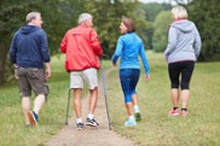 What is Ageing? Ageing is a process of accumulating experiences, enriching our lives through knowledge and physical skills. This acquired wisdom gives us the potential to make sensible and beneficial decisions about ourselves. The fullness and richness of our remaining years is in our hands. Barring accidents and disease the quality of our golden years is resolved primarily by ourselves. The more we control our lives the more enjoyable the remaining years can be. The degree of independence we have in our lives is directly related to how active we are in body, mind and spirit. In spite of some decreases in efficiency and capacity with increasing age, a relatively high level of physical and mental function can be maintained for years. We have a choice: a choice to give up our independence and fade away or to control and maintain vigorously active lives, fully enjoying our remaining years. Use it or lose it is a rule that applies to our bodies and minds. It is even more significant as we age since we gradually lose intellectual and physical capacity with increasing years. Keeping mentally and physically active reduces the rate at which we lose our functions and enable us to more fully enjoy and increase the quality of the golden years of our life. If ageing is making life difficult and you need help to improve your physical activity, diet or need help to remain independent, here at Therapy Professionals our friendly therapists can help. They are experienced helping people who are ageing and have age related disabilities, to maintain their independence and quality of life. Just contact Therapy Professionals Ltd. Phone: 03 377 5280. Email: [email protected] Website: www.therapyprofessionals.co.nz
We can help, we come to you. Reference: Healthy happy ageing – a positive approach to active living, Yvonne Wagorn, Sonia Théberge, William A. R. Orban 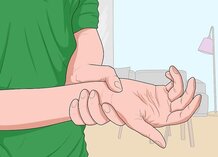 Multiple Sclerosis Multiple Sclerosis (MS) is a condition which affects the central nervous system, including the brain and spinal cord. MS is extremely variable affecting each person who has it in a different way. We don’t yet know the cause of MS, but it is thought to be an auto immune condition. Types of MS The course of MS is unpredictable. Some people are minimally affected by the disease while others have rapid progress to total disability with most people fitting between these two extremes. Although every individual will experience a different combination of MS symptoms, there are a number of distinct patterns relating to the course of the disease. Clinically Isolated Syndrome If a person has only had one episode or symptom they are generally diagnosed as having clinically-isolated syndrome (CIS). A person with CIS may or may not go on to develop clinically definite MS. Relapsing Remitting MS (RRMS) RRMS is the most common form of the disease. It is characterised by clearly defined acute attacks with either full recovery or with residual deficit upon recovery. Periods between disease relapses are characterised by a lack of disease progression. Approximately 85% of people with MS begin with a relapsing-remitting course. Secondary Progressive MS (SPMS) SPMS begins with an initial relapsing remitting disease course, followed by progression of a disability that may include occasional relapses and minor remissions and plateaus. Typically, secondary progressive disease is characterised by less recovery following attacks, persistently worsening function during and between attacks, and /or fewer and fewer attacks (or none at all) accompanied by progressive disability. According to some natural history studies, of the 85% who star with relapsing-remitting disease, more than 50% will develop SPMS within 10 years: with 90% within 25 years. More recent natural history studies (perhaps because of the use of MRI to assist in the diagnosis) suggest a more benign outlook that these numbers suggest. Primary Progressive MS (PPMS) PPMS is characterised by disability from onset, without plateaus or remissions or with occasional plateaus and temporary minor improvements. A person with PPMS, by definition, does not experience acute attacks. Of people with MS diagnosed, only 10% have PPMS. In addition, the diagnostic criteria for PPMS are less secure than those for RRMS so that often the diagnosis is only made long after the onset of neurological symptoms and at a time when the person is already living with significant disability. Progressive Relapsing MS (PRMS) PRMS, which is the least common disease course, shows progression of disability from onset but with clear acute relapses, with or without full recovery. Approximately 5% of people with MS appear to have PRMS at diagnosis. Not infrequently a patient may be initially diagnosed as having PPMS and then will experience an acute attack, thereby establishing the diagnosis of PRMS. It is believed that about 1 in 1000 New Zealanders have a diagnosis of PRMS. The MS and Parkinson’s Society run specialist exercise classes for people with MS, as well as monthly morning teas. MSNZ (http://ww.msnz.org.nz/) is a reliable online source of information about MS symptoms as well as for news and research updates. The Multiple Sclerosis a page on Health Navigator NZ (https://www.healthnavigator.org.nz/health-a-z/m/multiple sclerosis/) is also a good concise source of information. If you live in Canterbury and have recently been diagnosed with MS< or know someone who has and want to find out how you can support them, contact our office on (03) 366 2857 or email [email protected] If you need additional support to maintain your independence Therapy Professionals therapists can help, just contact us: Phone: 03 377 5280 Email: [email protected] Reference: Parkinsons (https://ms-pd.org.nz/parkinsons/)  Sensory Assessments Sensory assessments help identify the cause of some unusual behaviours triggered by sensitivities to sight, hearing, taste, touch, smell and movement. For people with Autism it can help identify:
Sensory Profile Assessments are useful for people of all ages. Our response to information from our senses changes as we grow, develop and age. This is why there are different assessments for each stage of life. A sensory assessment involves:
The interview has many questions and can take up to 1.5-2 hours approximately
Approximately 8-12 hours of therapist time. Contact: Therapy Professionals Ltd Phone: 03 377 5280 Fax: 03 377 5281 Email: [email protected] 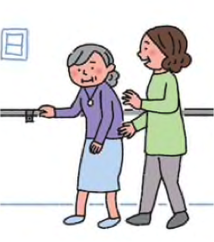 Tips to get those with dementia moving Exercise 1. Ensure there is a goal in sight for the client. Break longer walks into a series of short goals, eg, get them to walk to the chair over by the door, then walk to the dining table, then the door and finally to walk to the chair outside the toilet. Gesture where you want them to go. 2. Get your residents to walk to morning and afternoon tea and to see their visitors. 3. Sit your resident at the end of the bed, sit next to them ensuring you are invading their space, this will encourage them to move away from you towards the head of the bed, keep moving into their space until they are in the place you want them. Communication 1. Show respect for your client by listening to them. 2. Give commands not questions eg “Stand up” instead of “would you like to stand for me” 3. Give one command at a time (so they have time to understand). 4. Use their words eg if they use loo for toilet refer to the toilet as the loo. 5. Use gestures to indicate what you want them to do. Fears Demented clients often have difficulty getting out of the chair and walking downstairs. This is because they have a perceptual problem that causes them to feel they are falling off a cliff. 1. Getting out of a chair - place a chair or some barrier in front of them to give them a sense of security. Make sure it is far enough away so they do not use it to assist themselves to stand or move. 2. Walking downstairs – get the client to walk down sideways holding onto the rail. If you are still having trouble, our friendly physiotherapists may be able to help.
Just contact us at Therapy Professionals Ltd Phone: 03 377 5280 Email [email protected] Reference: Rosemary Oddy MRCP 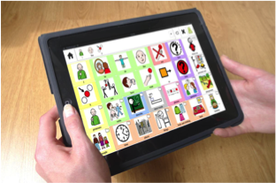 Enabling Good Lives Enabling Good Lives (EGL) is an exciting new approach to supporting people with disabilities. Currently it is only available to school leavers who have received ongoing resources (ORS) funding while at school. It has been trialled for almost 10 years, starting in Christchurch, Waikato and now in the Manawatu. EGL is a new approach to supporting disabled people that offers greater choices and control over the supports they receive, so that they can plan for the lives they want. Enabling Good Lives Principles from Website Achieving our future vision for disability supports is complex and will take time. There will be many details to work through. A principles-based approach will ensure we stay on track to progress the vision. We will use the principles in the Enabling Good Lives report to help guide decisions on the changes. The principles are: Self-determination Disabled people are in control of their lives. Beginning early Invest early in families and whānau to support them; to be aspirational for their disabled child, build community and natural supports; and to support disabled children to be come independent rather than waiting for a crisis before support is available. Person-centred Disabled people are supported to live an everyday life in everyday places; and are regarding as citizens with opportunities for learning, employment, having a home and family, and social participation – like others at similar stages of life. Mainstream first Disabled people are supported to access mainstream services before specialist disability services. Mana enhancing The abilities and contributions of disabled people and their families are recognised and respected. Easy to use Disabled people have supports that are simple to use and flexible. Relationship building Supports, builds and strengthens relationships between disabled people, their whānau and community. For more information on Enabling Good Lives visit: https://www.enablinggoodlives.co.nz 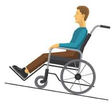 True independent community living requires skills, adaptations and support. Therapy Professionals Ltd’s therapists can help people gain skills and adapt their environments so they can be as independent as possible. Therapy Professionals Ltd’s therapists are available to help improve independence, health and wellbeing. Just contact us: Phone: 03 377 5280. Email: [email protected]
Reference: https://www.enablinggoodlives.co.nz |
AuthorShonagh O'Hagan Archives
July 2024
|

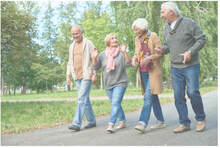
 RSS Feed
RSS Feed